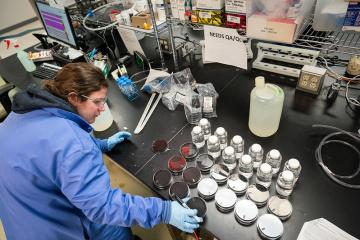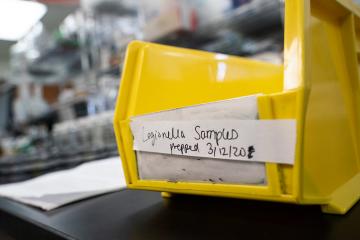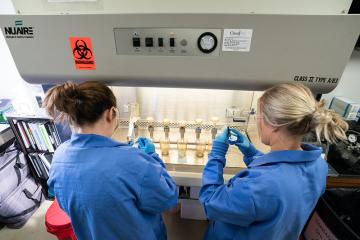A University of Wisconsin Oshkosh laboratory is helping ensure safe, clean water is flowing through faucets at hospitals, hotels and nursing homes in Wisconsin and beyond.
The Environmental Research and Innovation Center (ERIC) recently attained certification for Legionella testing by the Centers for Disease Control and Prevention (CDC). It joined just two other Wisconsin commercial labs with Environmental Legionella Isolation Techniques Evaluation (ELITE) Program certification.

“The ERIC remains open and is still doing testing for 19 health departments and various business partners that we have around North America,” said Gregory Kleinheinz, chair of the engineering technology department that includes the ERIC lab, as coronavirus treatment and prevention efforts have taken the forefront.
Legionella is a major public health concern―there’s risk of water-borne disease at all public facilities and institutions―even state fairs. Test samples come to the UWO ERIC directly from businesses as well as from plumbers and health departments. Routine sampling helps ensure safe water and specialized sampling is done in the investigation of an outbreak.
Legionella fast facts
Legionella is a potentially fatal infectious disease. The first reported outbreak was in 1976 in Philadelphia, Pennsylvania, during a Legionnaires Convention.
The bacteria that cause Legionnaires’ disease, a form of pneumonia, can’t be spread directly from one person to another. Instead, it is commonly spread to the lungs through aerosolized water, in the form of a mist or vapor.

In the later part of 2019, there were outbreaks reported at an Atlanta hotel that sickened dozens and at a North Carolina state fair, which resulted in four deaths. The North Carolina outbreak was linked to a hot tub display.
In the past couple of years, there have been outbreaks reported in Wisconsin at a Wisconsin Dells resort, a Tomahawk hotel, UW Hospital in Madison and an Elkhart Lake resort, according to statistics from Legionella Assessment and Management Plan Support.
Outbreaks are commonly associated with buildings or structures that have complex water systems, including hotels and resorts, long-term care facilities, hospitals and cruise ships. The most likely sources of infection include water used for showering, hot tubs, decorative fountains, and cooling towers, according to the CDC.
Carmen Thiel, manager of the UW Oshkosh ERIC lab, said outbreaks that can affect large populations similar to COVID-19, can occur from the consumption of waterborne microorganisms, such as norovirus or Cryptosporidium, both of which have occurred historically in Wisconsin.
Kleinheinz said UW Oshkosh started the certification process to help fill statewide need.
Work is performed by full-time employees at the ERIC and produces revenue, which is reinvested in student employment at the lab.

ERIC testing opens lab capacity
“We do not do COVID-19-related work,” Kleinheinz said, “but the work we do on various other fronts builds capacity in terms of expertise and testing capacity. As we have seen from the current COVID-19 situation, having only centralized resources available can cause backlogs, delays in results and lack of expertise in local communities. In our own small way we try to add expertise and capacity to our community, to Wisconsin and our partners.”
The CDC created the ELITE Program to identify laboratories that demonstrate proficiency in isolating Legionella from environmental samples. These laboratories can be helpful during public health investigations.
Typically, samples are routine, however Thiel said there have been occasions when bacteria has been detected.
When this occurs, the sampler must immediately recollect to confirm the presence of bacteria or begin remediation efforts such as the chlorination process. Thiel said there have been times when they’ve gotten repeat positive bacteria results and they work with the client to pinpoint the source of the bacteria―whether it be from the water distribution system or from an outside source.
Besides the ELITE legionella certification, the ERIC has certifications from the Wisconsin Department of Natural Resources; Department of Agriculture, Trade and Consumer Protection; U.S. Composting Council; and American Biogas Council.
Learn more:
